 rmally, when writers decide to tackle what was (and still is) called “the woman’s perspective,” it tends to be forecast from a couple thousand yards away and hammered into every sentence, whether it fits or not. It becomes an “issue” and something to be subtly reinforced as “other,” rather than what it truly is: a mundane examination of what goes on in the lives of half the population.
rmally, when writers decide to tackle what was (and still is) called “the woman’s perspective,” it tends to be forecast from a couple thousand yards away and hammered into every sentence, whether it fits or not. It becomes an “issue” and something to be subtly reinforced as “other,” rather than what it truly is: a mundane examination of what goes on in the lives of half the population.Even better, the writing on Mad Men doesn’t make another all-too-common mistake when they take on their female characters: they don’t assume that they all think and act the same way. We got a reminder of this last week when Joan threw a glass of ice-cold wake-the-fuck-up in Peggy’s face after she fired Joey. Even if all women are feeling the oppression of men in this time and place, they’re not all going to process it or react to it in unison. In other words, the writers of Mad Men take the radical point of view that women are all individuals with their own points of view and their own responses.
Starting from that individualistic perspective means that making “women” the theme of your story is going to be particularly difficult. After all, it’s much easier to write about a group of people if you can pretend that they all think the same way. But one of the many wonderful things the show accomplished in its first 3 seasons, and one of the things that 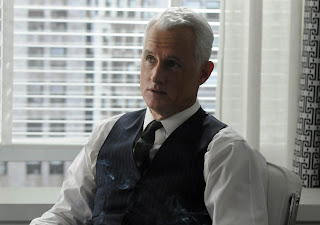 they’re so richly paying off in this highly satisfying 4th season, is that the women characters of Mad Men are not only all very different from each other, they are also richly drawn, with depths of emotion and personality that make them akin to living, breathing people that we all know.
they’re so richly paying off in this highly satisfying 4th season, is that the women characters of Mad Men are not only all very different from each other, they are also richly drawn, with depths of emotion and personality that make them akin to living, breathing people that we all know.
Joan has filed away the Joey episode and will likely never mention it again, choosing instead to focus her energies on not dealing with the major issue she is now facing. Her husband is being deployed to Vietnam and she will be, for the foreseeable future, a non-person: a wife without a husband and a woman in her thirties without a child. It may thrill all us Joan fans to watch her deftly navigate through the professional world, but the fact of the matter is, Joan does not want to be there. Her very first line of Season 4 was “I could use a vacation,” and the ghost of that sentiment has been hanging over her all year. She’s working because she has to; a situation that would have been quite embarrassing for her at the time. She’s getting no real happiness out of her dreary homelife and doesn’t have the tools or background that would allow her to even consider seeking happiness or fulfillment in the office, so she’s spent most of 1965 wandering around in an armored haze, going through the motions and stubbornly refusing to acknowledge the social changes happening right in front of her; changes that would allow her to seek her own fullfillment; to utilize her considerable intellect rather than her considerable body; to quite literally take off some of that armor.
Roger feigns shock that Greg would join the army without consulting her, but Joan wryly observes that Roger almost certainly doesn’t turn to Jane for discussion and consultation either. She understands how men think of women and she’s disappointed to discover that for all her hard work, she didn’t escape that wifely fate of lost identity.
It seemed to us even before this episode that the only real chance we see for Joan to find any happiness in her life is Roger, who has been dropping hints all year long that he still feels something for her. 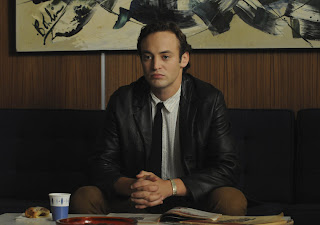 We really haven’t gotten much of a glimpse of his marriage this season, but the writing of his memoirs has left him in a melancholy place. Or as Joan once put it, he crossed the line from lubricated to morose and he’s been on the opposite side of that line for most of 1965. He genuinely misses her and all this year, he’s been coaxing her back into a relationship rather than back into bed. How fitting then that they wound up fucking in the streets, each of them giving into the adrenaline rush of danger as well as the emptiness in their lives. “I’m not sorry,” she says later, owning her actions, never a victim. “But I’m married, and so are you.” “I feel something and I know you do too,” Roger pleads. That’s not the typical slap-and-a-giggle smartass approach he takes with Joan. That’s as close to Roger declaring his undying love as he’s capable. Joan is dealing with the impetuous decisions of one man in her life so she has no answer for him. We’d hate to see her jump into something else that’s going to define her according to whatever man’s in front of her, but we have to say we hope this thing with Roger pans out. “Every time I think back all the good stuff was with you.” The men on this show can be the most self-absorbed assholes you could imagine, but when they really let their hearts show they can say the most incredibly sweet and romantic things. An undercurrent to Mad Men is that the men of the period were just as limited in their choices and as likely to be unhappy in their lives as the women.
We really haven’t gotten much of a glimpse of his marriage this season, but the writing of his memoirs has left him in a melancholy place. Or as Joan once put it, he crossed the line from lubricated to morose and he’s been on the opposite side of that line for most of 1965. He genuinely misses her and all this year, he’s been coaxing her back into a relationship rather than back into bed. How fitting then that they wound up fucking in the streets, each of them giving into the adrenaline rush of danger as well as the emptiness in their lives. “I’m not sorry,” she says later, owning her actions, never a victim. “But I’m married, and so are you.” “I feel something and I know you do too,” Roger pleads. That’s not the typical slap-and-a-giggle smartass approach he takes with Joan. That’s as close to Roger declaring his undying love as he’s capable. Joan is dealing with the impetuous decisions of one man in her life so she has no answer for him. We’d hate to see her jump into something else that’s going to define her according to whatever man’s in front of her, but we have to say we hope this thing with Roger pans out. “Every time I think back all the good stuff was with you.” The men on this show can be the most self-absorbed assholes you could imagine, but when they really let their hearts show they can say the most incredibly sweet and romantic things. An undercurrent to Mad Men is that the men of the period were just as limited in their choices and as likely to be unhappy in their lives as the women.
Peggy is learning that men are men and there are hardly any differences between nebbishy ex-boyfriend Mark, who tried to make her into someone she’s not (namely, someone who is close with her family and enjoys spending time with them) and well-intentioned Abe, who, 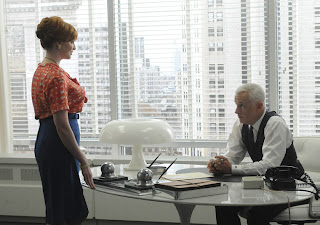 though enamored with her, still condescendingly pats her on the head for both working in an industry he doesn’t respect and for putting forth the then-radical idea that the struggle of women was akin to the struggle of African-Americans. Peggy can achieve everything her heart desires but, as Joan said last week “they can always draw a cartoon.” To Peggy, it seems that there will always be a man there to diminish her in some way, even when that man is sweet and well-intentioned and clearly infatuated with her. Joyce makes a somewhat strained analogy to pots and soup, her point being that men always try to define women. Peggy says she doesn’t believe that but it seems to us she’s kidding herself.
though enamored with her, still condescendingly pats her on the head for both working in an industry he doesn’t respect and for putting forth the then-radical idea that the struggle of women was akin to the struggle of African-Americans. Peggy can achieve everything her heart desires but, as Joan said last week “they can always draw a cartoon.” To Peggy, it seems that there will always be a man there to diminish her in some way, even when that man is sweet and well-intentioned and clearly infatuated with her. Joyce makes a somewhat strained analogy to pots and soup, her point being that men always try to define women. Peggy says she doesn’t believe that but it seems to us she’s kidding herself.
Faye is clearly enjoying her relationship with Don (in fact, the episode opens with her screaming her happiness to the heavens), but like Joan, there is a price to be paid for being a woman and living an unconventional (for the time) life and like Joan, she’s a little defensive about it. We found out last week when she quite publicly broke up with her boyfriend via pay phone that she doesn’t cook and it seems her lack of traditional domestic skills extends to children as well. The very second Don runs into a familial issue, her role as lover gets shunted aside (much against her wishes) in favor of forcing into a surrogate mother role for which she is ill-suited. When she protests, he notes that he’d ask his secretary, but she’s dead. It doesn’t matter what a woman does in any other part of her life, she will be reduced down to the role of secretary or mother. When she does badly at the mother part, she feels she’s failed a test and is being judged for her childlessness. To Don’s credit, he apologized immediately. But even then, it was Faye who ended the conversation by offering to set up dinner plans for the weekend, like a secretary would.
Even death can’t end a woman’s responsibility to the men she serves. Ida Blankenship’s death very quickly became about anything but Ida Blankenship’s life. “I don’t want to die in this office,” says Roger, her former lover. He’s shaken less by her death and more by what it personally represents to him. Of her life, he literally has nothing to say, except, as usual, to crack another joke about how she died the way she lived, “surrounded by the people she answers phones for.” It was 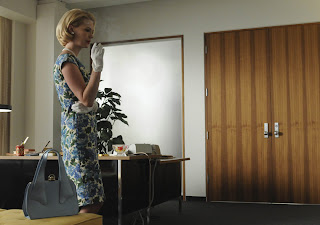 a genuine laugh out loud line, but it was still sad. She did spend her life serving (and sometimes servicing) these men and when she died, they couldn’t eulogize her, made jokes about her, and dismissed her in order to focus on themselves. “It’s a business of sadists and masochists and you know which one you are,” she warned Peggy, a lifetime of experience and pain behind that statement. Trust Bert Cooper, the ball-less man, to have a moment of clarity and sum up her life with aplomb. “She was born in 1898 in a barn, She died on the 37th floor of a skyscraper. She’s an astronaut.” Poetic, and oddly beautiful, but the fact remains that she never would have been an astronaut. She never would have been anything but a secretary (“Executive secretary,” corrects Joan, offering tribute in her own way) because she lived in a world that could see her as nothing else and when she stopped providing that service they had literally nothing else to say about her.
a genuine laugh out loud line, but it was still sad. She did spend her life serving (and sometimes servicing) these men and when she died, they couldn’t eulogize her, made jokes about her, and dismissed her in order to focus on themselves. “It’s a business of sadists and masochists and you know which one you are,” she warned Peggy, a lifetime of experience and pain behind that statement. Trust Bert Cooper, the ball-less man, to have a moment of clarity and sum up her life with aplomb. “She was born in 1898 in a barn, She died on the 37th floor of a skyscraper. She’s an astronaut.” Poetic, and oddly beautiful, but the fact remains that she never would have been an astronaut. She never would have been anything but a secretary (“Executive secretary,” corrects Joan, offering tribute in her own way) because she lived in a world that could see her as nothing else and when she stopped providing that service they had literally nothing else to say about her.
And Sally. Poor Sally. She may have been running away from her mother, but it shouldn’t be forgotten that the wreckage of the former Draper family is almost entirely Don’s fault. It seems of all the people who have paid a price for being exposed to Dick Whitman’s demons, it’s his daughter Sally who has suffered the most. It’s Sally who voices what all these women are feeling in their souls but can’t express because it wouldn’t be ladylike. “It’s going to be all right,” the fabulous and suddenly maternal Megan tells Sally after she has literally fallen on her face. “No it isn’t” she replies, a much blunter echo of something Joan said earlier in the episode to Roger (“It’ll be okay,” he said. “People love to say that,” she replied). But because of age and protocol and expectations, she couldn’t say what Sally blurted out. It’s NOT okay and it’s NOT going to be all right. And each of these women witness this moment of truth, shaken to the core by what it represents. And each of these women, spellbound by the revelation and overcome with emotion at seeing a young girl in despair, ignore social convention and office protocol to follow Sally out to the reception area and watch her get handed over to her mother. Betty is clearly (and okay, we admit it, DELICIOUSLY) uncomfortable in the office, where she can’t rely on everyone automatically agreeing that she was the victim in her former marriage. She is suddenly faced with the judgment of these women and it makes her deeply uncomfortable. Sally doesn’t feel anything at all. She says goodbye to her father robotically, resigned to the forces that keep her in her little box.
And at the end of the day, Ida gets wheeled off to be put in her little box and each of the 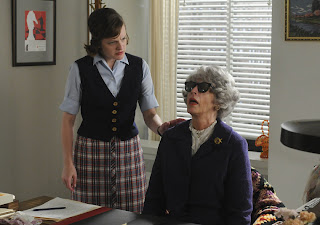 remaining women in the office line up to get into their own little box. As the elevator doors close on Faye, Peggy, and Joan we get an ironic take on the mother-maiden-crone formation again. This time, it’s the non-maternal woman, the maiden who secretly isn’t a maiden, and the crone who’s actually the most gorgeous of all of them.
remaining women in the office line up to get into their own little box. As the elevator doors close on Faye, Peggy, and Joan we get an ironic take on the mother-maiden-crone formation again. This time, it’s the non-maternal woman, the maiden who secretly isn’t a maiden, and the crone who’s actually the most gorgeous of all of them.
They could have turned to each other in this moment and talked about what they know and what they’ve seen. They could learn from each other and support each other but they don’t live in a time where such an idea was articulated and they didn’t have the tools to do so. Each of them forged a path in their career using very different tools, but it’s separated them from the very women who could best understand them and most help them out when they have a problem. Instead they stare straight ahead, lost in their thoughts and themselves.
Random thoughts:
* Lest you think we’re a total downer, that scene disposing of poor Ida’s body is probably one of the funniest sequences the show’s ever had. “My mother made that!” was hilarious.
* We can’t help thinking Peggy’s just a little too comfortable in the office and is heading toward paying a price for it. After firing Joey, she’s taunting her male co-workers by laughingly flirting with a lesbian right in front of them. Peggy’s a trailblazer but it has to be pointed out that this is PRE-feminism; a time when women suffered major paybacks for upsetting the status quo.
* Kiernan Shipka’s work as Sally was ridiculously good this episode. She has clearly been working very hard on her January Jones impression because some of those expressions and line readings were downright eerie in how close they came to mimicking Betty Draper. Sally is becoming the woman she hates the most. We think at least part of Don sees this.
* And while it’s nice to see Don’s got a little bit of his mojo back (Faye certainly seemed happy), he’s still drinking a little bit and he still mistreats the women around him. To his credit, he’s trying to understand and he seemed genuinely concerned that Faye was upset with him. Good for her for confronting him about it so quickly.
* On the other hand, Don is still Don and thinks offering to pay the woman who rescued his child was an appropria te way to show gratitude. As Betty once famously said of the former hillbilly, “I see how you are with money. You don’t understand it.”
te way to show gratitude. As Betty once famously said of the former hillbilly, “I see how you are with money. You don’t understand it.”
* As bad as we feel for Peggy, her response to civil rights as well as her lack of an understanding of just what it means to work for corporate America shows that her focus on her career has not exactly allowed her to become forward-thinking in other areas. Her arc this season seems to be about opening up her eyes a bit to what’s going on around her. We still hope this thing with cute nerdy Abe goes somewhere. He handled it all wrong, but he could be good for her if he learns to treat her like an adult.
[Photo credit: AMC TV]
Mad Style: S4E8 The Summer Man Next Post:
Glee Season 2 Episode 1: Audition
Please review our Community Guidelines before posting a comment. Thank you!



